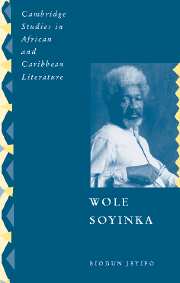Book contents
- Frontmatter
- Contents
- Preface
- Chronology
- List of abbreviations
- Chapter 1 ‘Representative’ and unrepresentable modalities of the self: the gnostic, worldly and radical humanism of Wole Soyinka
- Chapter 2 Tragic mythopoesis as postcolonial discourse – critical and theoretical writings
- Chapter 3 The “drama of existence”: sources and scope
- Chapter 4 Ritual, anti-ritual and the festival complex in Soyinka's dramatic parables
- Chapter 5 The ambiguous freight of visionary mythopoesis: fictional and nonfictional prose works
- Chapter 6 Poetry, versification and the fractured burdens of commitment
- Chapter 7 “Things fall together”: Wole Soyinka in his Own Write
- Notes
- Bibliography
- Index
Chapter 5 - The ambiguous freight of visionary mythopoesis: fictional and nonfictional prose works
Published online by Cambridge University Press: 22 September 2009
- Frontmatter
- Contents
- Preface
- Chronology
- List of abbreviations
- Chapter 1 ‘Representative’ and unrepresentable modalities of the self: the gnostic, worldly and radical humanism of Wole Soyinka
- Chapter 2 Tragic mythopoesis as postcolonial discourse – critical and theoretical writings
- Chapter 3 The “drama of existence”: sources and scope
- Chapter 4 Ritual, anti-ritual and the festival complex in Soyinka's dramatic parables
- Chapter 5 The ambiguous freight of visionary mythopoesis: fictional and nonfictional prose works
- Chapter 6 Poetry, versification and the fractured burdens of commitment
- Chapter 7 “Things fall together”: Wole Soyinka in his Own Write
- Notes
- Bibliography
- Index
Summary
What I do see is a new voice coming out of Africa, speaking in a worldwide language … The price a world language must be prepared to pay is submission to many different kinds of use. The African writer should aim to use English in a way that brings out his message best without altering the language to the extent that its value as a medium of international exchange will be lost.
Chinua Achebe, “The African Writer and the English Language”In narration he affects a disproportionate pomp of diction, and a wearisome train of circumlocution, and tells the incident imperfectly in many words, which might have been more plainly delivered in few. Narration in dramatic poetry is naturally tedious, as it is unanimated and inactive, and obstructs the progress of the action; it should therefore always be rapid, and enlivened by interruption. Shakespeare found it an incumbrance, and instead of lightening it by brevity, endeavoured to recommend it by dignity and splendour.
Samuel Johnson, Preface to the Plays of William ShakespeareWithin the entire body of Soyinka's writings, the fictional and nonfictional prose works constitute the most uneven group of works. This poses a formidable challenge for scholars and critics.
- Type
- Chapter
- Information
- Wole SoyinkaPolitics, Poetics, and Postcolonialism, pp. 167 - 219Publisher: Cambridge University PressPrint publication year: 2003



